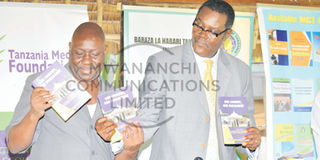Report calls for lifting of ban on Bunge coverage

Media Council of Tanzania executive secretary Kajubi Mukajanga (left) and Commission for Human Rights and Good Governance chairman Bahame Nyanduga display copies of the the investigation report on restrictions imposed on live coverage of parliamentary proceedings during its unveiling in Dar es Salaam yesterday. PHOTO | SAID KHAMIS
What you need to know:
- A new report by the Media Council of Tanzania (MCT) suggests that voters are eager to follow what their representatives do in the august House. They want to know if their MPs actually speak on their behalf while in Parliament.
Dar es Salaam. Calls for the ban on live Bunge coverage to be lifted are mounting, an indication that the matter has refused to go away.
A new report by the Media Council of Tanzania (MCT) suggests that voters are eager to follow what their representatives do in the august House. They want to know if their MPs actually speak on their behalf while in Parliament.
Also, the report, which was launched here yesterday, proposes that capacity building should be extended to journalists to increase their competence in reporting Parliamentary affairs.
It proposes that instead of restricting the media, Parliamentary Standing Orders should be effectively used against MPs with bad conduct.
The report adds that the government should clarify its claim that Bunge live broadcasts are costly. The document further says that Tanzania was much ahead of many Commonwealth countries, especially in Africa, in championing live Bunge coverage.
It argues that live coverage of Parliamentary sessions, therefore, has to be entrenched in the law in order to direct responsible organs to provide live coverage to Bunge sessions like in India, Britain, New Zealand and Australia.
“Based on previous and current experience and studies, live coverage of parliamentary sessions has increased public participation in governance issues. The people have been enlightened to follow parliamentary debate, question their leaders in order to understand the kind of people sent to Parliament,” reads in part the report.
Dubbed Our Country, Our Parliament, the report suggests that there should be flexibility in reporting Bunge sessions and that television reporters should access live feeds for them to report in line with the guiding ethics and code of conduct of their profession.
The report further reveals that the people’s right to information deteriorated further due to the ban of live coverage and that if the trend continues as it is, all the gains achieved in the last two decades would be completely lost.
The findings of the report show that Executive’s events at State House, including swearing in of Cabinet ministers, regional commissioners, district executive directors and other similar posts continue to go live on State-owned TBC1 even during normal working hours.
“Therefore, it is a case of irony and double standards for the establishment to ban Bunge live coverage and yet allows live telecast for events organised by the Executive. State broadcaster (TBC1) shouldn’t be prerogative of the Executive in providing opportunities to inform the public,” reads the report in part.
The report adds: “It is crucial to observe that as the executive functions are regarded important and therefore broadcasted live, it is equally important that Bunge sessions are accorded the same treatment”.
On building journalists’ capacity, the report recommends strengthened collaboration between media houses and Office of the National Assembly Clerk in order to improve competency in reporting Bunge matters.
Reporters’ understanding in Parliamentary procedures, politicians and political parties, governing laws, history of parliamentary democracy as well as conventions of parliamentary practice should be sharpened.
The report further proposes the revival and strengthening of the Association of Parliamentary reporters in order to ensure it plays an important role in organising study visits in other Commonwealth countries to gather experience on proceedings.
Regarding the cost argument that the governmnet put forth while imposing the ban, the report proposes that an independent fund should be established within Parliament to be known as Bunge Broadcasts Fund (BBF) to be charged with attracting funds from within and outside the National Assembly in order to ensure live Bunge coverage and related activities are maintained.
Also, in interviews with lawmakers, Parliament officers and government executives established that the real reason behind the ban was that some bigwigs were unhappy with the way some parliamentarians conducted themselves. The behaviours ranged from truancy, dosing off during debates, use of abusive language and sometimes making statements or claims that were baseless.
“While they think their honour and respect was being challenged, the public and the media feel erring MPs shouldn’t be protected, instead Standing Orders and regulations should be used accordingly against them,” reads the report.
Presenting an overview of the report, renowned journalist Pili Mtambalike—who together with colleagues, Mr Hamis Mzee and information rights activist, Mr Deus Kibamba, were commissioned by MCT to conduct the survey—said they had to go through the history of Parliamentary live coverage in the Commonwealth countries.
According to Ms Mtambalike, they also revisited content statements given by the government, weighing impacts of the ban and making recommendations.
Talking of consequences of the ban, the report says suspending live Bunge broadcasts has left Tanzanians unaware of what happens in the august House.
“This is the concern of the majority, including the Presidential Delivery Bureau, which is in-charge of the Big Results Now (BRN) that more Tanzanians were left out of the development picture,” a section of the report reads.



